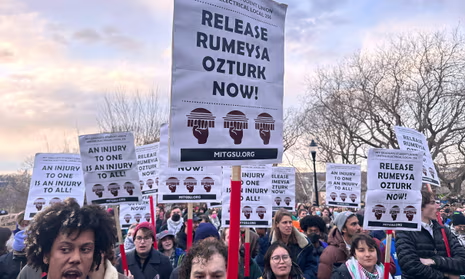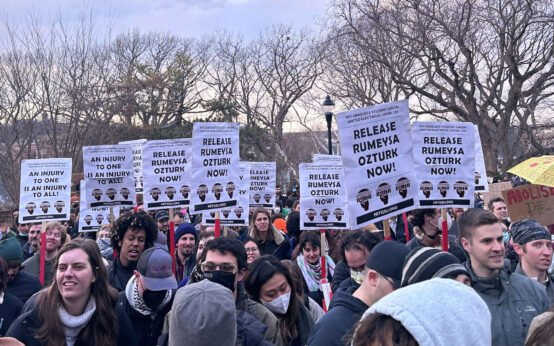Introduction to Rumeysa Ozturk Pro-Palestinian Activism
The topic of activism in America, particularly on college campuses, has grown increasingly prominent amidst global concerns over the Israel-Palestine conflict. At this crossroads of dissent and discourse stands Rumeysa Ozturk, a Muslim student, activist, and public figure whose advocacy for Palestinian rights has been both celebrated and contested. Her involvement sheds light on larger questions surrounding freedom of speech, civil liberties, and the role of youth in reshaping political discourse about the Middle East.
Ozturk’s activism, including protests, organizing efforts, and public statements, has become a focal point for the rise of pro-Palestinian movements in the U.S., a phenomenon that challenges existing narratives around U.S. foreign policy and campus politics. This article explores her story, its broader implications for student and digital activism, and what her advocacy tells us about the shifts in political engagement across the country.
Table of Contents
Who Is Rumeysa Ozturk and How Did She Get Involved in Pro-Palestinian Activism?
Rumeysa Ozturk first entered the public eye as a student activist at Tufts University. Her upbringing in a bicultural family with deep connections to Muslim identity laid the groundwork for her eventual role as a prominent voice in the advocacy for Palestinian rights.
Ozturk became involved in activism during her undergraduate years through organizations like Students for Justice in Palestine (SJP), a student group dedicated to boycotting Israeli products and promoting awareness of Palestinian struggles. Her leadership in organizing pro-Palestinian protests and events at Tufts made her a recognizable figure not just within the campus, but also in national youth-led circles.
The Evolution of Pro-Palestinian Activism in the U.S. and Rumeysa Ozturk’s Role
Pro-Palestinian activism in the U.S. has undergone a seismic evolution in recent decades. What was once considered a niche movement is now part of mainstream campus discourse, reflecting wider socio-political awakenings among youth. The visibility of human rights violations in Gaza and the West Bank, coupled with mounting U.S. involvement in the Middle East, has galvanized student groups to call for justice and accountability.
Ozturk sits at the crux of this shift. By leveraging contemporary tools like digital activism and campus protests, she has helped amplify the movement’s message to broader audiences. Her ability to connect the complex history of the Middle East conflict with themes of civil liberties resonates strongly with a new generation of socially conscious students.
How Rumeysa Ozturk’s Pro-Palestinian Activism Sparked Controversy
Despite bringing issues of Palestinian rights into the spotlight, Ozturk’s activism has not been without its controversies. Accusations of anti-Semitism from her critics loom large over her advocacy, though Ozturk and her supporters frequently rebut such claims as conflations of legitimate criticism of Israeli policies with hatred toward Jews.
Additionally, her participation in Boycott, Divestment, Sanctions (BDS) campaigns has drawn criticism from both conservative groups and certain university administrators, who argue that such campaigns stifle discourse rather than promote it. These debates illustrate the fine line activists like Ozturk walk, navigating a space where free speech is often contested and highly politicized.
Campus Activism Spotlight: Rumeysa Ozturk’s Involvement at Tufts University
Tufts University has historically been a hub for vibrant political debate. Ozturk’s presence brought unprecedented energy to its activist scene, particularly through her involvement in student-led demonstrations and controversial campus events. Whether leading a sit-in outside administrative offices or hosting lectures on U.S. foreign policy, Ozturk leveraged her position to engage the campus community in nuanced conversations about justice, equality, and human rights.
Her efforts frequently intersected with other social justice movements, connecting struggles faced by Palestinians to Black Lives Matter, indigenous rights, and immigrant advocacy. This intersectionality grounded Ozturk’s activism in solidarity across marginalized communities, distinguishing her from more traditional approaches to advocacy.
What Sets Rumeysa Ozturk’s Pro-Palestinian Activism Apart?
What makes Ozturk’s activism unique is not just her passion, but her strategic use of digital activism to galvanize support. Platforms like Twitter and Instagram have allowed her to reach an audience far beyond the borders of Tufts.
Ozturk combines viral social media campaigns with in-person organizing, blending the immediacy of digital tools with the power of human connection. By creating shareable infographics, live-streaming events, and engaging in online conversations, Ozturk has effectively cultivated a sense of connection within an expansive network of advocates.
How Social Media Elevated Rumeysa Ozturk’s Pro-Palestinian Message
Social media plays a pivotal role in amplifying Ozturk’s message. The use of platforms like Instagram, TikTok, and X (formerly Twitter) facilitates the rapid dissemination of information. Ozturk’s posts range from snapshots of rallies to infographics outlining historical contexts and policy critiques. These digital tools lower the barrier for entry into activism for younger audiences, offering an accessible platform for political engagement.
Through hashtags such as #FreePalestine and viral social campaigns that touch upon other intersections of human rights, Ozturk has mobilized thousands to participate in online conversations. Her strong digital presence ensures that the arguments for Palestinian advocacy are no longer confined to private discussions but displayed on public forums.
Public Perception of Rumeysa Ozturk and the Broader Activist Movement
Ozturk is viewed as both an inspiration and a polarizing agent, underscoring the charged emotions that accompany pro-Palestinian activism. Many hail her as a bold voice elevating marginalized perspectives, while others criticize her affiliations with movements they consider extreme.
This divide in public perception reflects broader tensions within student political discourse. The stakes of activism are high, and the impassioned responses to Ozturk’s actions indicate growing anxieties about the complex relationships between activism, free speech, and civil liberties.
The Legal and Political Risks of Pro-Palestinian Activism
Ozturk’s activism also highlights the risks that student activists face, particularly those advocating for Palestinian rights. Her recent detention sparked debates about visa restrictions imposed on student activists and whether they are disproportionately applied to individuals engaged in controversial advocacy.
The legal challenges faced by Ozturk reflect broader trends in how immigration and civil liberties intersect with political expression. These risks, while daunting, also underscore the resilience of activists who continue to voice dissent despite systemic obstacles.
The Future of Pro-Palestinian Activism in the U.S.
Rumeysa Ozturk’s story stands as both a rallying cry and a cautionary tale for those engaging in advocacy. Her ability to mobilize young audiences, challenge institutional norms, and persist against adversity speaks volumes about the transformative power of student activism.
Pro-Palestinian movements in the U.S. are likely to continue growing, bolstered by individuals like Ozturk who champion intersectional human rights. However, the future of these movements hinges on resolving larger questions regarding free speech, academic freedom, and the limits of government intervention.
For those inspired by the story of Rumeysa Ozturk and the broader rise of pro-Palestinian activism, the road ahead requires careful navigation—but also a fearlessness in the pursuit of justice.


 Did the U.S. Revoke Rumeysa Ozturk Visa Revoked Unfairly? Key Facts Explained
Did the U.S. Revoke Rumeysa Ozturk Visa Revoked Unfairly? Key Facts Explained  Why Was Rumeysa Ozturk Detained? The Full Story Behind Her Case
Why Was Rumeysa Ozturk Detained? The Full Story Behind Her Case